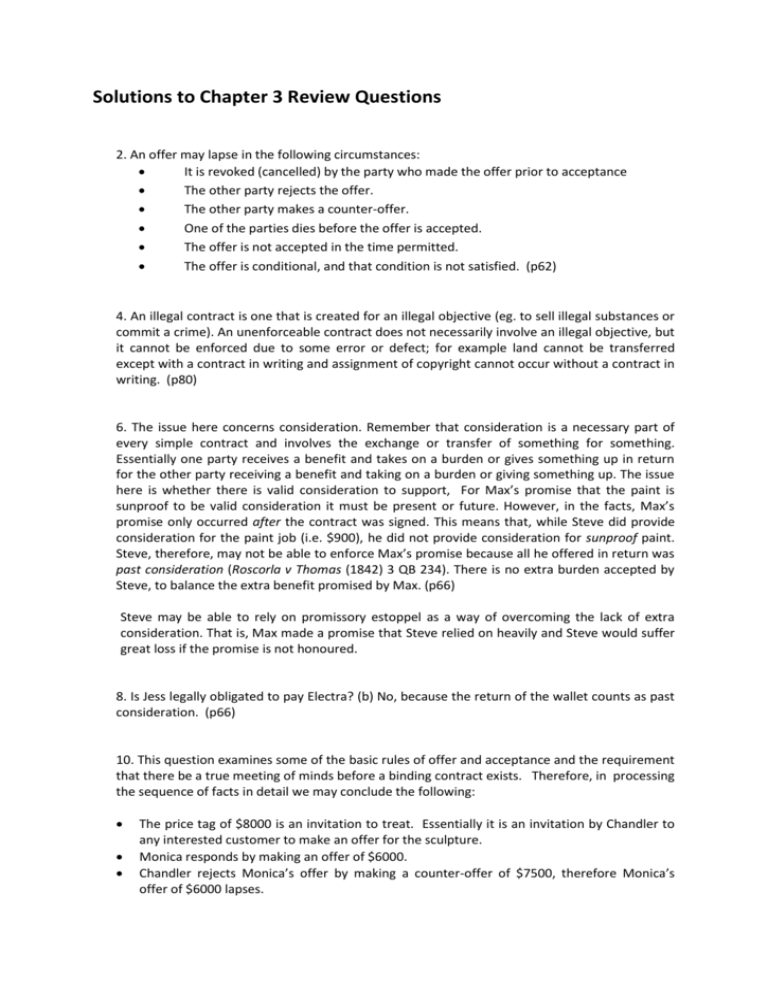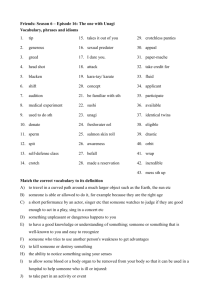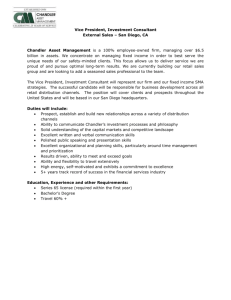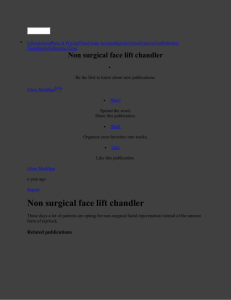Solutions to Chapter 3 Review Questions
advertisement

Solutions to Chapter 3 Review Questions 2. An offer may lapse in the following circumstances: It is revoked (cancelled) by the party who made the offer prior to acceptance The other party rejects the offer. The other party makes a counter-offer. One of the parties dies before the offer is accepted. The offer is not accepted in the time permitted. The offer is conditional, and that condition is not satisfied. (p62) 4. An illegal contract is one that is created for an illegal objective (eg. to sell illegal substances or commit a crime). An unenforceable contract does not necessarily involve an illegal objective, but it cannot be enforced due to some error or defect; for example land cannot be transferred except with a contract in writing and assignment of copyright cannot occur without a contract in writing. (p80) 6. The issue here concerns consideration. Remember that consideration is a necessary part of every simple contract and involves the exchange or transfer of something for something. Essentially one party receives a benefit and takes on a burden or gives something up in return for the other party receiving a benefit and taking on a burden or giving something up. The issue here is whether there is valid consideration to support, For Max’s promise that the paint is sunproof to be valid consideration it must be present or future. However, in the facts, Max’s promise only occurred after the contract was signed. This means that, while Steve did provide consideration for the paint job (i.e. $900), he did not provide consideration for sunproof paint. Steve, therefore, may not be able to enforce Max’s promise because all he offered in return was past consideration (Roscorla v Thomas (1842) 3 QB 234). There is no extra burden accepted by Steve, to balance the extra benefit promised by Max. (p66) Steve may be able to rely on promissory estoppel as a way of overcoming the lack of extra consideration. That is, Max made a promise that Steve relied on heavily and Steve would suffer great loss if the promise is not honoured. 8. Is Jess legally obligated to pay Electra? (b) No, because the return of the wallet counts as past consideration. (p66) 10. This question examines some of the basic rules of offer and acceptance and the requirement that there be a true meeting of minds before a binding contract exists. Therefore, in processing the sequence of facts in detail we may conclude the following: The price tag of $8000 is an invitation to treat. Essentially it is an invitation by Chandler to any interested customer to make an offer for the sculpture. Monica responds by making an offer of $6000. Chandler rejects Monica’s offer by making a counter-offer of $7500, therefore Monica’s offer of $6000 lapses. Monica rejects Chandler’s counter-offer of $7500 by making a counter-offer of $6500, therefore Chandler’s counter- offer of $7500 lapses. Chandler rejects Monica’s counter-offer of $6500, which lapses. Monica then purports to accept Chandler’s earlier counter-offer of $7500, believing that offer and acceptance and therefore a true meeting of minds, is complete. However, because of the earlier rejection of this counter-offer it has lapsed and no longer exists. In fact, Monica has now become the offeror in making the fresh offer to Chandler of $7500, which provides to Chandler the offeree, the choice whether to accept or reject the offer. Chandler does not reply and therefore there is no acceptance, no contract between Monica and Chandler, and Chandler is free to sell the sculpture to Rachel for $8000. (p61-63) 12. Fabien already agreed to his recipes being placed in the book without payment. This means that when Monica said she would pay him $2,000 he was not providing any consideration in return. Fabien cannot claim that the provision of his recipes counts as consideration because it is past consideration (Roscorla v Thomas (1842) 3 QB 234). As Fabien has not provided fresh consideration, no new contract has been formed so Monica is not legally obligated to pay him the $2,000 she promised. In Win’s case, the recipes she has prepared for Monica in the course of her employment at Beyond Yum already belong to her employer, Monica. Therefore the inclusion of Win’s recipes in the recipe book do not represent consideration for any new contract. Win is doing no more than she is already required to do under her existing contract of employment. (p67) 14. When a representation is made to induce a contract it is not sufficient that the statement is only true at the time it is made. Dawn must keep Cordelia informed of a change in circumstances. Cordelia will be successful in rescinding the contract. (75) Had Dawn lied in her statement, then genuine consent would not have been given by Cordelia due to fraudulent misrepresentation. As a result the contract is void. Cordelia could sue Dawn for damages. (76) 16. Tara’s contract with Dawn is a voidable contract which enables her to choose to set the contract aside as the elements of legal capacity and reality of consent are absent from the agreement. Tara can argue she has a lack of legal capacity because she has a mental disorder, of which Dawn was aware, that meant she did not properly understand the contract into which she entered. Further, Tara can argue there is a lack of genuine consent due to either unconscionable conduct (Dawn was exploiting Tara’s mental disability and affection for her for her own advantage) or undue influence (Dawn holds a position of trust with Tara that she is abusing). Dawn may sue Global Domination Advisors Pty Ltd for the action of their employee Angel for providing her information that was out of date and incorrect. Dawn will take action in negligent misrepresentation and claim damages for her loss. This is because Angel is holding himself out as an expert in the field and therefore has a duty of care to advise Dawn carefully. (See Esso Petroleum v Mardon (1976) QB 801) (p68-71) 18. George would not be successful in suing Kramer because the contract was made for an illegal objective (i.e. to defraud the police). Therefore, the contract is void for illegality and cannot be successfully upheld by George. (p72) 20. The client –solicitor relationship is a fiduciary one. As a result a solicitor is in a position to use undue influence to coerce a client into a contract. The client should take steps to ensure that the solicitor cannot abuse their influencer. Having the car independently checked is a solution. (p78) The arm's length principle (ALP) is the condition or the fact that the parties to a transaction are independent and on an equal footing. Such a transaction is known as an "arm's-length transaction". It is used specifically in contract law to arrange an equitable agreement that will stand up to legal scrutiny, even though the parties may have shared interests (e.g., employeremployee) or are too closely related to be seen as completely independent (e.g., the parties have familial ties). 22. (a) True (b) False (c) True (d) True (e) False (f) False (g) True (h) True (i) True 24. (a) In the case of Carlill v Carbolic Smoke Ball Co (1893) 1 QB 256 (discussed at page 62-63), Mrs. Carlill’s purchase and use of the carbolic smoke ball in reliance on the company’s offer, in the newspaper amounted to acceptance of the offer. It was considered to be a unilateral contract where the offeree’s fulfilment of their obligations under the contract demonstrates acceptance. Usually, silence does not amount to acceptance. However, in the case of Empirnall Holdings v Mark Machon Paull Partners (1988) 14 NSWLR 523 p 64 the court held that silence, when combined with other circumstances may amount to acceptance. In this case the developer’s conduct when he paid the architect according to the progress claim schedule from the contract he maintained did not exist would suggest to a reasonable person that the developer had in fact accepted the architect’s offer. (b) From the facts, it would appear that Escardo made no promises to Steep that he would receive extra payment for undertaking duties as acting foreperson in June. However, it is clear that an extra $50 a week was promised by Escardo to Steep if he maintained the position as foreperson after June. This is future consideration and is binding. (p67) ( c ) Original offer is revoked by the counter offer (p62)






